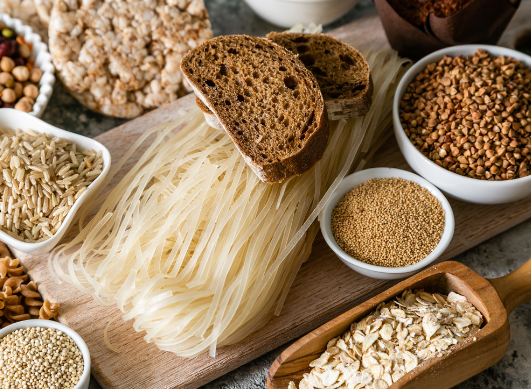- Home
- Share
- Forum
- General forums
- Research and useful tips - Ankylosing spondylitis
- 8 Diet tips for people with Ankylosing Spondylitis
8 Diet tips for people with Ankylosing Spondylitis
- 34 views
- 0 support
- 2 comments
All comments
![]()
Kathmorr
![]()
Kathmorr
Last activity on 06/03/2018 at 22:49
Joined in 2018
2 comments posted | 1 in the Research and useful tips - Ankylosing spondylitis group
Rewards
-
Explorer
it was ver helpful Lots of things to think about as I am over weight.eating wrong things

Margarita_k
Community managerGood advisor
![]()
Margarita_k
Community manager
Last activity on 07/10/2020 at 11:39
Joined in 2016
1,195 comments posted | 32 in the Research and useful tips - Ankylosing spondylitis group
1 of their responses was helpful to members
Rewards
-
Good Advisor
-
Contributor
-
Messenger
-
Committed
-
Explorer
-
Evaluator
Thank you for your feedback @Kathmorr !
See the signature
Community Manager
Give your opinion
Survey
Articles to discover...

14/03/2025 | Nutrition
Carbohydrates: Friend or foe? Everything you need to know to make the right choices!
Subscribe
You wish to be notified of new comments
Your subscription has been taken into account







Margarita_k
Community managerGood advisor
Margarita_k
Community manager
Last activity on 07/10/2020 at 11:39
Joined in 2016
1,195 comments posted | 32 in the Research and useful tips - Ankylosing spondylitis group
1 of their responses was helpful to members
Rewards
Good Advisor
Contributor
Messenger
Committed
Explorer
Evaluator
Even though there is no proof that diet can be part of a treatment plan for people with Ankylosing spondylitis, it is highly recommended for patients to pay attention to what they eat. The reason is that some foods, or just an imbalanced diet, as many other lifestyle factors, can have an impact on flare-ups and on the severity of the symptoms.
So here is how you can help yourself feel better by adjusting your diet:
1. Eat a well-balanced diet.
Your body needs a wide variety of nutrients to cope with the challenges of daily life with AS. Eat plenty of fresh, healthy foods, including fruits, vegetables, and whole grains. Consume limited amounts of fats, especially saturated fats found in animal products. Steer clear of diets that eliminate entire food groups or allow you to eat only a few select meals.
2. Don't fall for fad diets.
You’ll likely come across ads or articles about the latest nutritional cures for arthritis. But no diet has been shown to ease all symptoms or cure the disease. Some of these plans actually harm your health. Avoid diets with high-dose alfalfa, copper salts, or zinc, or that severely limit calories and fat. And always work with your health care provider or a nutritionist to ensure you’re getting the proper nutrients.
3. Track your eating habits.
Foods that might work fine for one person with AS can aggravate symptoms in others. Keeping a food diary for a few weeks can make a big difference. Write down what you eat and when, and then note what happens to your symptoms. You may find some foods trigger flares, while others help you feel better.
4. Don't drink too much alcohol.
People with AS have a higher risk for the bone-thinning disease osteoporosis. Beverages containing alcohol weaken your skeleton, especially if you sip more than two per day. Alcohol may also interfere with some medications. Check with your health care provider or pharmacist to see if drinking is safe for you.
5. Get enough calcium and vitamin D.
These two nutrients strengthen bones, reducing your risk for osteoporosis. Most adults need 1,000 to 1,200 milligrams of calcium per day, but ask your health care provider how much you require. Calcium-rich foods include dairy products, kale, broccoli, and fortified cereals or juices. Vitamin D is found in some fish, and your body produces it when exposed to the sun. Your health care provider may recommend supplements.
Here is an article on foods rich in Vitamin D, you should take a look
6. Ask how your medications interact with your diet.
Different medicines for AS will affect your body’s ability to absorb electrolytes and nutrients in different ways. For instance, some medicines may cause you to retain sodium, while others reduce your levels of potassium or folic acid. You may need to eat special foods or take supplements to offset these imbalances. In other cases, you’ll need to avoid certain foods that can interact with your medicines. Your health care provider or pharmacist can explain more.
7. Maintain a healthy weight.
Balance the amount of calories you take in with those you burn to stay in a healthy range. Extra pounds stress your joints and bones, potentially worsening your disease. On the flip side, being underweight increases your risk for complications, from fatigue to anemia to osteoporosis. Your health care provider or nutritionist can help you find middle ground.
8. Swap red meat for other options.
Most people with AS do best if they eat no more than two meals per week containing red meat. That’s because meat contains a compound called arachidonic acid. This can aggravate the inflammation that causes symptoms. Fish is a good alternative because it contains inflammation-fighting omega-3 fatty acids. Keep fish consumption to twice a week, too. Flaxseed and walnuts are other great sources of omega-3.
__________________
Have you noticed any difference in your symptoms depending on what you ear/drink? If you did, you are more than welcome to share your feedback with us!